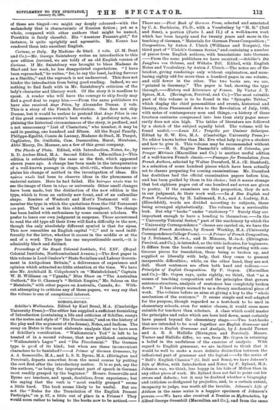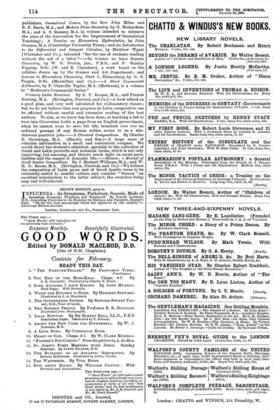SOHOOL-BOOKS.
Schiller's Wallenstein. Edited by Karl Breul, M.A. (Cambridge University Press.)—The editor has supplied a sufficient furnishing of Introduction (containing a life and criticism of Schiller, essays on the metre and style of " Die Piccolomini," and on the history of the play and the argument of the drama), Notes, and Indices. The essay on Metre is the most elaborate analysis that we have seen of Schiller's versification. " Wallenstein's Tod" is left to be treated of in a second volume, that now published containing " Wallenstein's Lager" and "Die Piccolomini." The German type is good of its kind; but when are these inconvenient characters to be banished ?—A Primer of German Grammar, by A. A. Somerville. MA., and L. S. R. Byrne, M.A. (Rivington and Percival), departs somewhat from the usual course by putting the verb first after the introductory matter. It is so put, say the the authors, "as being the important part of speech in German most readily grasped by the beginner." Messrs. Somerville and Byrne are teachers, and speak, doubtless, from experience; but the saying that the verb is " most readily grasped" seems a little hard. The book seems likely to be useful. But are not the "Rules for the Translation of the English Present Participle," on p. 97, a little out of place in a Primer? They would seem rather to belong to the books now to be uotioed.— These are :—First Book of German Prose, selected and annotated by C. A. Buchheim, Ph.D., with a Vocabulary by " H. R." (Bell and Sons), a portion (Parts I. and II.) of a well-known work which has been largely used for twenty years and more in the teaching of German," Materials for German Prose Composition ; " Composition, by Anton J. Ulrich (Williams and Norgate), the third part of " Ulrich's German Series," and containing a number of pieces from English authors, with translations into German. —From the same publishers we have received :—Elehiliar's Die Jungfraa von Orleans, and Wilhelm Tell. Edited, with English Notes and Vocabulary, by Anton J. Ulrich.—The notes are of the briefest, giving renderings only without explanation, and num- bering eighty odd for more than a hundred pages in one volume, and still fewer in the other. The two books are, we see, "printed in Germany." The paper is bad, showing the type through.—History and Literature of France. By Victor J. T. Spiers, M.A. (Rivington, Percival, and Co.)—The most valuable part of this volume is to be found in the "Synoptic Tables," which display the chief personalities and events, historical and literary, from Pharamond down to the Revolution of July, 1830, with notes of contemporary men and things,—a history of these fourteen centuries compressed into less than sixty pages neces- sarily does not aim high. The tables of literature are followed by a sketch of the subject equally brief. The volume will be found useful.—Louis XI. TragOdia par Casimir Delavigne. Edited by H. W. Eve, M.A. (Cambridge University Press.)— No editor knows better than Mr. Eve what help to give a student and how to give it. This volume may be recommended without reserve.—M. G. Eugene Fasnacht's edition of Colomba, par Prosper Mdrimge (Macmillan and Co.) is another useful edition of a well-known French classic.—Passages for Translation from French Authors, selected by Walter Durnford, M.A. (E. Stanford), is a selection of some hundred pieces which have been actually set to classes preparing for coming examinations. Mr. Durnford has doubtless had the official examination papers before him, and has been guided by them in his choice; but it seems strange that but eighteen pages out of one hundred and seven are given to poetry. If the examiners use this proportion, they do not, in our judgment, do their work well.—In A New English and French Vocabulary, by H. Lallemand, B.A., and A. Ludwig, B.A. (Hirschfeld), words are divided according to subjects, these being arranged alphabetically. The volume has a serviceable look. But why " books " under "stationery " ? Surely they are important enough to have a heading to themselves.—In the " University Tutorial Series," part of the machinery by which the " University Correspondence " classes are carried on, we have the Tutorial French Accidence, by Ernest Weekley, M.A. (University Correspondence College Press).—A Primer of French Composition, by J. Duhamel, M.-es-A., and B. Minssen, M.-es-A. (Rivington, Percival, and Co.), is intended, as the title indicates, for beginners. It differs from the books commonly used by starting with con- tinuous pieces for translation, these being so broken up, and supplied so liberally with help, that they cease to present insuperable difficulties ; while, on the other hand, they are not dull. Short sentences are often both hard and tedious.— Principles of English Composition. By P. Goyen. (Macmillan and Co.)—Mr. Goyen says, quite rightly, we think, that " as a means of teaching composition and the principles that govern sentence-structure, analysis of sentences has completely broken down." It has always seemed to us a dreary mechanical piece of work. The volume before us aims at giving a key to the whole mechanism of the sentence." It seems simple and well adapted for the purpose, though regarded as a text-book to be used in elementary schools, even for senior classes, it would seem more suitable for teachers than scholars. A class which could master the principles and rules which are here laid down, must certainly have passed beyond the elementary stage.—Two text-books that are intended to be used together are English Grammar and Exercises in English Grammar and Analysis, by J. Arnold Turner and A. R. S. Hallidie (Rivington and Percival). Messrs. Turner and Hallidie differ, we see, from Mr. Goyen in retaining a belief in the usefulness of the exercise of analysis. With regard to English grammar, we are inclined to think that it would be well to make a more definite distinction between the inflexional part of grammar and the logical.—In the series of " Bell's English Classics " (G. Bell and Sons), we have Johnson's Life of Milton, with Introduction and Notes by F. Ryland, M.A. Johnson was, we think, less happy in his Life of Milton than in any other piece of work. Mr. Ryland does not fail to point out his errors and defects ; but it may be doubted whether a biography and criticism so disfigured by prejudice, and, to a certain extent, incapacity to judge, was worth all the trouble. Johnson's Life of Addison in the same series is a happier specimen of Johnson's powers.—We have also received A Treatise on Hydrostatics, by Alfred George Greenhill (Macmillan and Co.), and from the same publishers, Geometrical Conics, by the Rev. John Milne and R. F. Davis, M.A., and Modern Plane Geometry, by G. Richardson, M.A., and A. S. Ramsey, M.A. (a volume intended to subserve the aims of the Association for the Improvement of Geometrical Teaching) ; A Treatise on Elementary Hydrostatics, by John Greaves, M.A. (Cambridge University Press); and An Introduction to the Differential and Integral Calculus, by Matthew Wyatt (Whittaker and Co.), intended "for the use of students reading without the aid of a tutor."-In Science we have Organic Chemistry, by W. II. Perkin, jun., F.R.S., and F. Stanley Kipping, D.Sc. (W. and R. Chambers), a work based on the syllabus drawn up by the Science and Art Department ; and Lessons in Elementary Chemistry, Part I., Elementary, by G. S. Tarpin, D.Sc. (Macmillan and Co.)-A Short Commercial Arithmetic, by F. Glanville Taylor, M.A. (Methuen), is a volume in " Methuen's Commercial Series."



















































 Previous page
Previous page